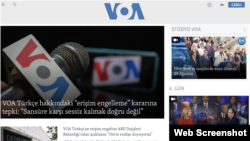Access to the VOA Turkish website voaturkce.com was blocked in Turkey on Tuesday, following a court order banning access due to the international news organization's failure to apply for a broadcast license from Turkey's media regulator.
In a warning posted on its website on August 21, the Radio and Television Supreme Council (RTUK) gave VOA Turkish 72 hours to apply for an on-demand broadcast license or risk having the court block access to VOA Turkish content.
The media watchdog cited a 2019 law that authorizes RTUK to request licenses from "media service providers" for their radio, TV and on-demand services in order for them to continue their online presence. Broadcast executives who air content without a license could face charges that carry sentences of up to two years in prison.
VOA's public relations department in Washington said the broadcaster does not plan to obtain a license from the regulator.
"Given VOA's status as a public service international broadcaster legally required to provide 'accurate, objective, and comprehensive' news coverage to its global audience, VOA cannot comply with any directive intended to enable censorship," VOA spokesperson Bridget Serchak said in an email.
VOA received no response to emails requesting comment from RTUK after the order last week and a message sent late Tuesday.
Banned without a hearing
Following RTUK's request Monday to block access to VOA Turkish content, Ankara's 9th Criminal Court of Peace issued the ban the same day without holding a hearing.
The court order, obtained by VOA, said the access-blocking decision was sent to the Access Providers Association, an organization that carries out media bans in Turkey. The court also stated that its ruling can be appealed within seven days.
The decision comes more than a year after RTUK banned access to VOA Turkish's previous domain name, amerikaninsesi.com, and German public broadcaster Deutsche Welle, as the news outlets refused to comply with the regulator's license requirement because of censorship concerns.
On July 1, 2022, after the access ban was placed on VOA Turkish and DW, RTUK said that if the outlets acted in accordance with the regulation, "blocking their websites by the independent judiciary would not have been applied."
"If these broadcasting websites form companies in our country and start their licensing process in accordance with our laws, RTUK will request from the judicial authorities to terminate the access ban," RTUK said in a statement.
"RTUK supports pluralism, free press, and free reporting by media outlets. However, like every democratic country, Turkey is a state with the rule of law. RTUK, which is a guide to the sector, is in favor of the legal dissemination of news content under certain guarantees," the regulator added.
Ruling also blocks alternate domain
VOA Turkish moved to a different domain name months after RTUK blocked access in June 2022. Monday's court ruling blocks access to content under that domain name, as well.
The on-demand broadcast license requested by RTUK is commonly acquired by streaming platforms such as Netflix, Disney+ and Amazon Prime Video to operate in the Turkish market.
The law enables RTUK to impose fines, suspend broadcasting for three months or cancel broadcast licenses if the licensees do not follow RTUK's principles.
Press freedom advocates say that obtaining a broadcast license from RTUK would allow the regulator to censor news content.
Gurkan Ozturan, who coordinates the Media Freedom Rapid Response alliance at the European Centre for Press and Media Freedom (ECPMF), views the court ruling against VOA Turkish as a "development that gradually diminishes media freedom and increases the pressure that media outlets face."
"It is quite possible that unwanted news content will be subject to content removal orders after obtaining a license," Ozturan told VOA.
He also noted that RTUK's involvement in news content has increased in recent years.
"We have seen that RTUK has ruled to ban access with arbitrary decisions on the basis of moral values, especially over LGBTI+ news content and all kinds of content in digital media," Ozturan added.
Press freedom groups push back
In April 2023, 20 press freedom organizations, including ECPMF, Freedom House and the International Press Institute, called on RTUK "to immediately stop fining broadcasters for their critical reporting. Journalists and broadcasters must be allowed to do their jobs of informing the public over critical issues and holding the government to account."
Erol Onderoglu, the Turkey representative for Reporters Without Borders and the media freedom rapporteur for the Bianet press agency, thinks RTUK's license requirement should not be deemed as a simple procedure.
"While the opposition and critical media in Turkey are crushed under the RTUK's fines, it would be naive to look at the process of international digital platforms and news websites with RTUK as a simple licensing procedure," he told VOA.
"An institution like RTUK is expected to stand out with its constructive and regulatory work in democracies," he continued. "However, unfortunately, RTUK has gained a reputation as a censorship authority not only in Turkey but also beyond borders."
According to Ozgur Ogret, the Turkey representative for the Committee to Protect Journalists, one of the most important issues for the Turkish government is to control the news flow by overseeing "what information would be disseminated, in what way it would be shared, and from what point of view it would be discussed."
To achieve this, "the government tries to make local media outlets dysfunctional as much as possible with various economic pressures and judicial harassment, and the foreign media outlets as inaccessible as possible," he told VOA.
"It is possible to circumvent access blocks. It is even quite easy," Ogret said. "However, blocking the right to access information should not be accepted so easily. I do not find it right to remain silent about censorship, because we can overcome it."
Hilmi Hacaloglu contributed to this report.











